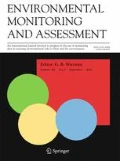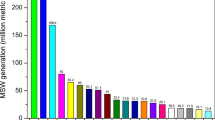Abstract
Information on waste generation, socioeconomic characteristics, and willingness of the households to separate waste was obtained from interviews with 402 respondents in Dhaka city. Ordinary least square regression was used to determine the dominant factors that might influence the waste generation of the households. The results showed that the waste generation of the households in Dhaka city was significantly affected by household size, income, concern about the environment, and willingness to separate the waste. These factors are necessary to effectively improve waste management, growth and performance, as well as to reduce the environmental degradation of the household waste.
Similar content being viewed by others
References
AIT-UNEP RRC.AP (Asian Institute of Technology/United Nations Environment Programme, Regional Resource Centre for Asia and the Pacific) (2005). Dhaka City state of environment: 2005. Cited on 18 August 2010. Available at http://www.rrcap.unep.org/pub/soe/dhaka-soe-05/3-6dhaka-waste.pdf.
Al-Momani, A. H. (1994). Solid waste management: Sampling, analysis and assessment of household waste in the city of Amman. International Journal of Environmental Health Research, 4, 208–222.
BBS (Bangladesh Bureau of Statistics) (1999). Population census 1991.
BBS (Bangladesh Bureau of Statistics) (2001). Population census 2001.
Beukering, P. V. (1997). Waste recovery in Bombay—A socioeconomic and environmental assessment of different waste management options. Third World Planning Review, 19(2), 163–187.
Carson, R. T., Mitchell, R. C., Hanemann, W. H., Kopp, R. J., Presser, J., & Ruud, P. A. (1992). A contingent valuation study of lost passive use values resulting from the Exxon Valdez oil pill. Report to the Attorney General of the State of Alaska, Anchorage.
CIA (Central Intelligence Agency) (2010). The world factbook. Cited on 18 August 2010. Available at https://www.cia.gov/library/publications/the-world-factbook/geos/bg.html.
DCC (Dhaka City Corporation) (2005). Clean Dhaka master plan: The study on the solid waste management in Dhaka City. Final Report.
DCC (Dhaka City Corporation) (2010). Welcome to Dhaka City Corporation. Cited on 18 August 2010. Available at http://www.dhakacity.org/Page/To_know/About/Category/2/Id/21/Type/Quick/Info.
DiGregorio, M. R. (1994). Urban harvest: Recycling as a peasant industry in Northern Vietnam. East-WestCenter Occasional papers, Environment Series 17: Honolulu.
Fullerton, D., & Kinnaman, T. C. (1996). Household demand for garbage and recycling collection with the start of a price per bag. American Economic Review, 86, 971–984.
Furedy, C. (1992). Garbage: Exploring non-conventional options in Asian cities. Environment and Urbanization, 4(2), 42–61.
Grossmann, D., Hudson, J. F., & Marks, D. H. (1974). Waste generation models for solid waste collection. Journal of the Environmental Engineering Division, 100, 1219–1230.
Hong, S., & Adams, R. M. (1999). Household responses to price incentives for recycling: Some further evidence. Land Economics, 12, 505–514.
Hong, S., Adams, R. M., & Alan, L. H. (1993). An economic analysis of household recycling of solid wastes: The case of Portland, Oregon. Journal of Environmental Economics and Management, 25, 136–146.
Huysman, M. (1994). Waste picking as a survival strategy for women in Indian cities. Environment and Urbanization, 6(2), 155–174.
Imber, D., Stevenson, G., & Wilks, L. (1993). A contingent valuation survey of the Kakadu conservation zone. Reprint, RAC Research Paper, 1(3). Canberra: Resource Assessment Commission.
Jenkins, R. B. (1993). The economics of solid waste reduction. The impacts of user fees. Edward Elgar.
Jenkins, R. R., Martinez, S. A., Palmer, K., & Podolsky, M. J. (2003). The determinants of household recycling: A material-specific analysis of recycling program features and unit pricing. Journal of Environmental Economics and Management, 45, 293–318.
Jin, J., Wang, Z., & Ran, S. (2006). Estimating the public preferences for solid waste management programs using choice experiments in Macao. Waste Management Research, 24, 301–309.
Kealy, M. J., Montgomery, M., & Dovidio, J. F. (1990). Reliability and predictive validity of contingent values: Does the nature of the good matter? Journal of Environmental Economics and Management, 19, 244–263.
McConnell, K. (1995). Issues in estimating benefits with non-market methods. Inter American Development Bank, Working Paper Series No. 308.
Medina, M. (1997). The effect of income on municipal solid waste generation rates for countries of varying levels of economic development: A model. Journal of Resource Management and Technology, 24, 149–155.
Nilanthi, J. G. J. B., Patrick, J. A. H., Wirasinghe, S. C., & Sumith, P. (2006). Relation of waste generation and composition to socio-economic factors: A case study. Environmental Monitoring and Assessment, 135, 31–39.
Pfammatter, R., & Schertenleib, R. (1996). Non-governmental refuse collection in low-income urban areas (Lessons learned from selected schemes in Asia, Africa and Latin America. SANDEC Report No. 1/96). Water and Sanitation in Developing Countries. Duebendorf, Switzerland: EAWAG/SANDEC.
Richardson, R. A., & Havlicek, J., Jr. (1978). Economic analysis of composition of household solid wastes. Journal of Environmental Economics and Management, 5, 103–111.
Richardson, R. A., & Havlicek, J., Jr. (1974). An analysis of seasonal household waste generation. Southern Journal of Agricultural Economics, 6, 143–155.
Sicular, D. T. (1992). Scavengers, recyclers, and solutions for solid waste management in Indonesia. Berkeley: University of California at Berkeley.
Sinha, A., & Enayetullah, M. I. (2000). Community based solid waste management: The Asian experience. Dhaka: Waste Concern & USAID.
Tam V. W. Y., & Tam, C. M. (2008). Waste reduction through incentives: A case study. Building Research and Information, 36, 37–43.
Wertz, K. L. (1976). Economic factors influencing household’s production of refuse. Journal of Environmental Management and Economics, 2, 263–272.
Author information
Authors and Affiliations
Corresponding author
Rights and permissions
About this article
Cite this article
Afroz, R., Hanaki, K. & Tudin, R. Factors affecting waste generation: a study in a waste management program in Dhaka City, Bangladesh. Environ Monit Assess 179, 509–519 (2011). https://doi.org/10.1007/s10661-010-1753-4
Received:
Accepted:
Published:
Issue Date:
DOI: https://doi.org/10.1007/s10661-010-1753-4




